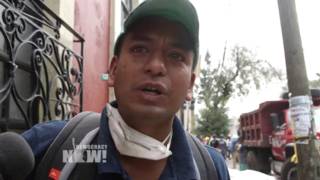
Topics
In Mexico, the death toll from Thursday’s devastating 8.2-magnitude earthquake has risen to 90 people as rescue teams continue to search through the rubble in parts of the southern states of Oaxaca and Chiapas. Over the weekend, journalist Andalusia Knoll spoke to survivors from the earthquake in Juchitán, Oaxaca, which was the city hardest hit by the earthquake.
Transcript
AMY GOODMAN: And finally, we end in Mexico. The death toll from Thursday’s devastating 8.2-magnitude earthquake has risen to 90, as rescue teams continue to search through the rubble in parts of the southern states of Oaxaca and Chiapas. Over the weekend, journalist Andalusia Knoll spoke to survivors from the earthquake in Oaxaca, in Juchitán, the city hardest hit by the earthquake.
MARÍA TERESA GARCÍA MORALES: [translated] My name is María Teresa García Morales, and this is where my mother lived. My mother died the day of the earthquake while rescuing my niece and my sister. We are here in Asunción Ixtaltepec, Oaxaca. It is a town where we are lacking many things, and the children are lacking them, too. We don’t have water. Please, people, those in the city, help us more than ever. One has to have solidarity with our people and help us, because we don’t have anywhere to live. We don’t have anywhere to stay. We are staying in the streets, in the open air, and sometimes it rains. And we have to see where we can stay.
JOSÉ JUAN ROBLEDO CASTILLO: [translated] This is where my bed was. Here was the bed. And I ran outside and successfully grabbed my daughters. It was this tree trunk that fell on top of our bed. I had to move the trunk to drag the bed out and use here in the backyard, because that is where we are staying. We have to stay in the backyard, because we are still at risk that the house will fall down, and the government help and help from the municipal government has still not arrived. They came to visit us here on the street corner. But up until now, we haven’t had any help from the government of the municipality of Juchitán.
GAIL REGALADO: Yeah, my name is Gail Regalado. It is the only one time that we received something for help. No other kind of people, especially governments, municipal or the federal government—they didn’t bring us anything, as we don’t have water. And, of course, we don’t have electricity. We don’t have electricity. So, for example, in this moment, when it’s at night, we feel really scared, because, you know, the earthquake, the movement, we feel really scared, because we don’t have light. So it’s that kind of—and, of course, we need something that—a kind of food that we can eat for these days.
AMY GOODMAN: Voices from Juchitán, Oaxaca, which was the city hardest hit by last week’s earthquake off the coast of Mexico.













Media Options